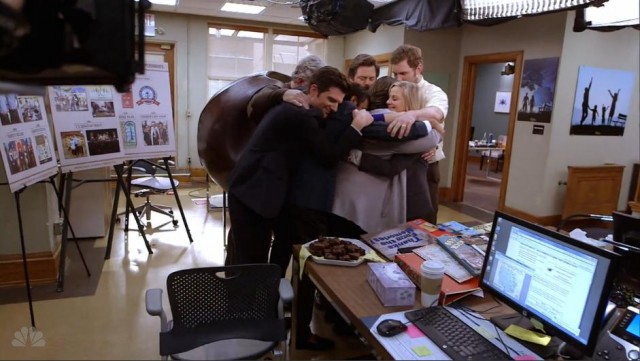Parks and Rec and Money

NBC’s Parks and Recreation aired its series finale on Tuesday, and I held off on writing anything about it until it showed up on streaming services on Wednesday, and even now I’m not going to give out any spoilers (although the comments are fair game to discuss the episode, so be prepared).
But I don’t think it’s a spoiler to say it ended happily.
Parks and Rec has always been about ambition and aspiration, and I didn’t realize until very recently just how much it was about financial aspiration as well. I mean, I saw the Jezebel post from a few years ago about how the Parks employees couldn’t afford the clothes they were wearing, that a $125 J. Crew sweater just didn’t make sense on a government worker salary, and I tossed it off as, you know, TV magic.
Also, they’re wearing J. Crew and Madewell, not clothes from Wearable Diamonds Emporium. It’s not like they’re trying to present themselves as unrealistic examples of middle-class adults, right? We’re supposed to watch along and think “yeah, I could totally get that blouse and that haircut and find my team and get to work.”
Then a friend sent me this Cracked article, 5 Insane Things You Believe About Money (Thanks to Movies), and this paragraph stuck with me:
And no matter how dumb their decisions, no matter how costly the failure, they’re in exactly the same spot the next week, as if there is no level you can fail to beyond, “struggling, but getting by.” They never lose their homes, the bank doesn’t seize their businesses, and they don’t have to take a second job instead of sleeping. They have room to try things, take risks, and get hurt, because, after all, that’s what defines all fictional protagonists: They act. They keep pushing and experimenting. That’s what makes them heroes.
The Cracked article is worth reading not because it says “hey, did you know that TV and movie characters live in apartments they would never be able to afford in real life,” but because it reminds us that TV characters have the freedom to bounce back from financial setbacks in a way that real-world people do not:
I think this is the part of poverty that is the hardest to understand from the outside: The sheer weight of knowing you won’t get those second chances, and how risk-averse it forces you to be. After I failed at one career, I took out $9,000 in loans to take certification classes in another. It turned out I sucked at that, too. And … that was it. I was out of chances — no more student loans (the payments were already higher than I could afford), and my credit cards were maxed out.
Parks and Rec is pretty good at showing reasonably realistic financial scenarios — Tom’s various businesses and the various reasons they fail, April and Andy’s terrible rental home with “shock wire” in the bathroom — but the characters always manage to put on their J. Crew and pull themselves out of whatever pit they’ve fallen into. We don’t see, for example, Leslie and Ben talking about which of them is going to quit their job, since the cost of daycare for triplet infants is probably higher than one of their salaries. We don’t see how April and Andy bought their haunted house, or what they did with the house when they decided to move to Washington, DC literally seven episodes later. (LIT-erally.)
We don’t see anyone dealing with the cost of caring for aging parents, or caring for their children — we don’t even see anyone dealing with the cost of caring for themselves, beyond a few references to Dr. Richard Nygard, a joke about a $500 health insurance deductible (and let me tell you, I wish all of our deductibles were only $500), and one injunction to “stop pooping!” Does April have student loans? Did they go into debt to produce that Johnny Karate show? Does it matter?
Parks and Rec is ultimately meant to be about aspiration, and it’s a bit of a shocker to realize that the life it depicts — decent jobs, happy partnerships, J. Crew blouses, plenty of opportunity — is in itself overwhelmingly aspirational. When I saw the series finale, I felt inspired to find my own team and start our own amazing projects. Today, I feel like even the Parks world might be just a little bit out of my reach.
What about you?
Support The Billfold
The Billfold continues to exist thanks to support from our readers. Help us continue to do our work by making a monthly pledge on Patreon or a one-time-only contribution through PayPal.
Comments